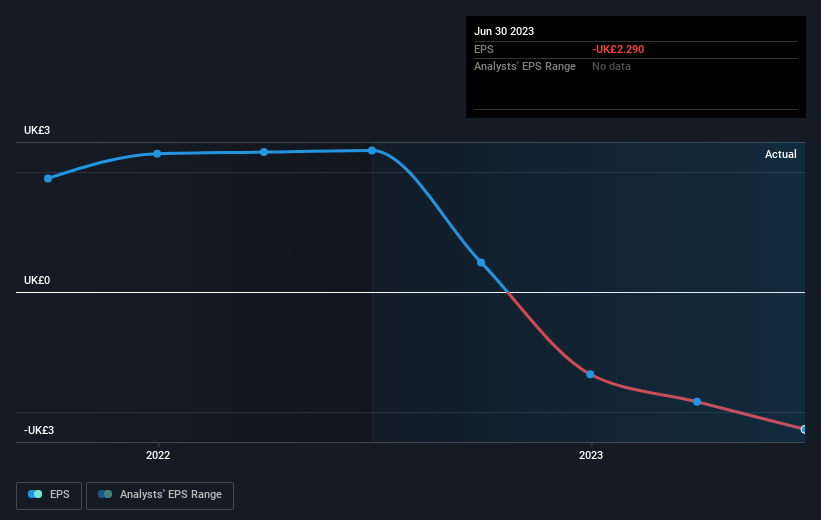- United Kingdom
- /
- REITS
- /
- LSE:HCFT
Highcroft Investments (LON:HCFT investor one-year losses grow to 11% as the stock sheds UK£5.5m this past week

The simplest way to benefit from a rising market is to buy an index fund. Active investors aim to buy stocks that vastly outperform the market - but in the process, they risk under-performance. That downside risk was realized by Highcroft Investments Plc (LON:HCFT) shareholders over the last year, as the share price declined 17%. That's disappointing when you consider the market declined 0.2%. The silver lining (for longer term investors) is that the stock is still 12% higher than it was three years ago.
Since Highcroft Investments has shed UK£5.5m from its value in the past 7 days, let's see if the longer term decline has been driven by the business' economics.
View our latest analysis for Highcroft Investments
While the efficient markets hypothesis continues to be taught by some, it has been proven that markets are over-reactive dynamic systems, and investors are not always rational. One imperfect but simple way to consider how the market perception of a company has shifted is to compare the change in the earnings per share (EPS) with the share price movement.
During the last year Highcroft Investments saw its earnings per share drop below zero. Buyers no doubt think it's a temporary situation, but those with a nose for quality have low tolerance for losses. However, there may be an opportunity for investors if the company can recover.
The graphic below depicts how EPS has changed over time (unveil the exact values by clicking on the image).

Dive deeper into Highcroft Investments' key metrics by checking this interactive graph of Highcroft Investments's earnings, revenue and cash flow.
What About Dividends?
It is important to consider the total shareholder return, as well as the share price return, for any given stock. The TSR incorporates the value of any spin-offs or discounted capital raisings, along with any dividends, based on the assumption that the dividends are reinvested. It's fair to say that the TSR gives a more complete picture for stocks that pay a dividend. As it happens, Highcroft Investments' TSR for the last 1 year was -11%, which exceeds the share price return mentioned earlier. This is largely a result of its dividend payments!
A Different Perspective
Highcroft Investments shareholders are down 11% for the year (even including dividends), but the market itself is up 0.2%. However, keep in mind that even the best stocks will sometimes underperform the market over a twelve month period. On the bright side, long term shareholders have made money, with a gain of 4% per year over half a decade. It could be that the recent sell-off is an opportunity, so it may be worth checking the fundamental data for signs of a long term growth trend. I find it very interesting to look at share price over the long term as a proxy for business performance. But to truly gain insight, we need to consider other information, too. Like risks, for instance. Every company has them, and we've spotted 2 warning signs for Highcroft Investments (of which 1 is a bit unpleasant!) you should know about.
Of course Highcroft Investments may not be the best stock to buy. So you may wish to see this free collection of growth stocks.
Please note, the market returns quoted in this article reflect the market weighted average returns of stocks that currently trade on British exchanges.
Valuation is complex, but we're here to simplify it.
Discover if Highcroft Investments might be undervalued or overvalued with our detailed analysis, featuring fair value estimates, potential risks, dividends, insider trades, and its financial condition.
Access Free AnalysisHave feedback on this article? Concerned about the content? Get in touch with us directly. Alternatively, email editorial-team (at) simplywallst.com.
This article by Simply Wall St is general in nature. We provide commentary based on historical data and analyst forecasts only using an unbiased methodology and our articles are not intended to be financial advice. It does not constitute a recommendation to buy or sell any stock, and does not take account of your objectives, or your financial situation. We aim to bring you long-term focused analysis driven by fundamental data. Note that our analysis may not factor in the latest price-sensitive company announcements or qualitative material. Simply Wall St has no position in any stocks mentioned.
About LSE:HCFT
Highcroft Investments
Highcroft Investments PLC is an internally managed Real Estate Investment Trust (REIT) which invests in commercial property in England and Wales.
6 star dividend payer and fair value.


